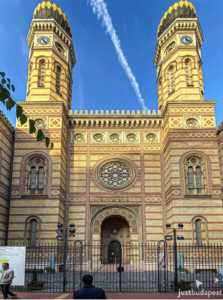

An unusual experience on the train from Salzburg to Munich yesterday. The train stopped at the German border, whereupon eight police officers, well armed and wearing full body armor, boarded the train and asked to see passports. I haven’t had a passport check on a European train in years, and I thought they were obsolete in the era of the Schengen Zone that allows visa-free travel throughout the European Union. And even in the old days the passport checks were done by train conductors, or at most one police officer.
The officer glanced quickly at my passport and handed it back, but then proceeded on to two pairs of Arab males seated elsewhere in our car. They got thoroughly tossed, with their passports being scrutinized as if trying to detect a forgery, followed by a series of questions, all conducted in English: “Where are you coming from? What is your destination? What is the purpose of your trip? How long are you staying? Who are you staying with?”
I didn’t hear any of the answers clearly, but I’m pretty sure this was what would be called “profiling” in the U.S. And small wonder why: with pro-Hamas protests verging on riots in some German cities such as Berlin, along with the defacement of Jewish sites throughout the country, it is likely that German security wants to screen out possible reinforcements from elsewhere.
I couldn’t help but feel like it was contemporary re-enactment of the scene of the train stop at the border in Grand Budapest Hotel (below), as Germany is suddenly back to asking, “Your paperz pleaz”—and we approve of it! (Though Germany should be faulted for opening the floodgates to massive immigration back in 2015. Still, even slow learners should be commended.)
The Grand Synagogue of Budapest
I haven’t witnessed any of the pro-Hamas demonstrations first hand, but you can’t help but notice that Europe is on edge. During my stay in Budapest I was located near the vibrant Jewish quarter of town, where I noticed that the main synagogue—supposedly the largest in Europe—had no visible police presence before October 7. After October 7, there were two officers out front, but that’s as far as I could see in the entire neighborhood. (I should add that overall police presence in Budapest is comparatively light, for the sensible reason that law and order is enforced there.) Hungary, as mentioned previously, continues to defy EU pressure to admit “migrants” to its small country.
This contrasts sharply with Vienna. A year ago I passed through Vienna and wandered by Judenplatz, site of a Holocaust memorial and Jewish cultural center, and and noticed two army guards with automatic weapons, necessary because of Islamicist-inspired attacks back in the 2000s. On my return to Vienna last weekend the military presence around the Judenplatz and the wider neighborhood had increased manyfold, with close to a dozen heavily armed security stationed at building entrances and SWAT vehicles stationed nearby. I also observed a number of conspicuous police vans and personnel stationed throughout downtown.
A friend who has lived in Vienna for 15 years observed: “We’ve let in too many of the wrong people.”
The story of a continent. Vienna is nothing compared to France, which has mobilized its army because of mounting threats. From whom, you ask? Even the New York Times can’t sugarcoat it:
Thousands of troops were being deployed to guard sensitive locations across France, and the Louvre Museum and the Palace of Versailles were evacuated in separate security alerts, as the country remained on edge on Saturday after the killing of a schoolteacher in a stabbing attack that the authorities described as an act of Islamist terrorism.
France has been under its highest terrorist threat level since Friday, when the teacher, Dominique Bernard, was killed at a school in Arras, in northern France. A suspect was quickly arrested at the scene: Officials said he was a former student of Mr. Bernard’s, and had already been under surveillance as a potential Islamist extremist.
In other words, another “known wolf” that our politically correct governments lack the will to detain and deport.
To adapt Herbert Stein’s famous aphorism about economics for a different subject: Something that can’t go on forever, won’t. Except maybe adapting Lincoln’s warning applies better: a house divided against itself cannot stand. Either Europe will become all one thing, or all the other.
P.S. Re: Grand Budapest Hotel—The film is said to be based on the writings of the Austrian-born Jewish writer Stefan Zweig, author of the classic memoir, The World of Yesterday. I always pick up Zweig’s book again every time I come to central Europe, which is nearly every year lately. It reads more relevant than ever just now.

